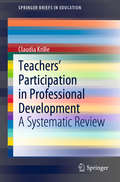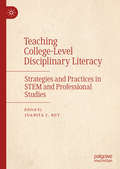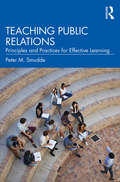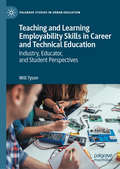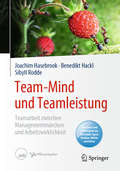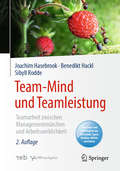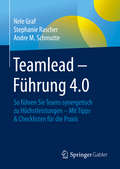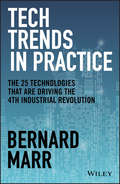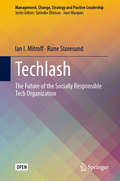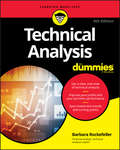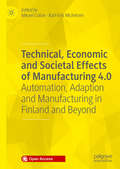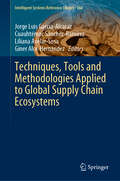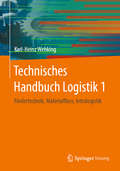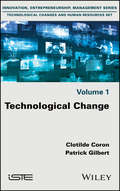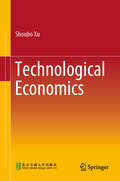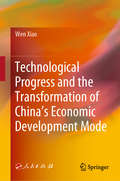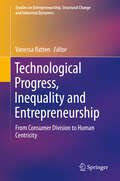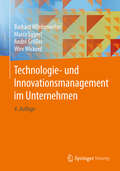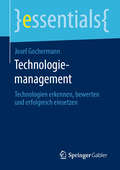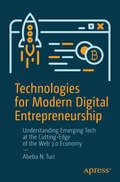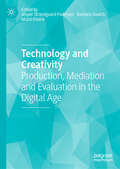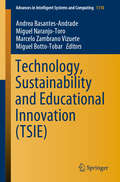- Table View
- List View
Teacher Education in Globalised Times: Local Responses in Action
by Jillian Fox Colette Alexander Tania AsplandThis book provides commentary on the influence of multi-layered political contexts that surround the work of teacher educators worldwide. It addresses the drawbacks of the massification, standards-based movements and marketisation of universal business that threaten authenticity, innovation and entrepreneurship within teacher education on a global scale. The chapters celebrate the richly described local stories that explore the often tacit political activity that underpins teacher educators’ work. The book highlights the commitment of both teachers and teacher educators to social justice, and human rights and critical consciousness as central to the process of teacher development. Teacher formation, teacher education policies and curriculum development in an era of globalisation, super-diversity and the positioning of Indigenous populations, and national regulation and localisation are topics that are explored in this book.
Teachers' Participation in Professional Development: A Systematic Review (SpringerBriefs in Education)
by Claudia KrilleThis book presents a systematic literature review focusing on studies examining teachers’ participation in professional development (PD) within Germany, Austria, and Switzerland since 1990. It has identified 81 relevant studies and summarizes the results while answering the following research questions: What are teachers’ self-reported reasons participate in formal PD? What barriers do teachers report that prevent them to participate in formal PD? What individual and context characteristics are associated with teachers’ PD behavior? Teachers’ PD is considered to be an important part of the teaching profession. It is seen as a tool for constant further development for teachers to adapt to changing standards in schools and classrooms, requirements for students, and personal challenges associated with the daily work in school. However, it is repeatedly claimed that there is no sufficient research with regard to teachers’ participation in formal PD, as well as of aspects that may influence their PD behavior. In spite of a large number of studies that contribute to this question within Germany, Austria, and Switzerland, only a few of them are cited regularly. Since much of this research is published in German, the results are not accessible for international researchers and comparisons between different countries. This comprehensive review makes these result accessible.
Teaching College-Level Disciplinary Literacy: Strategies and Practices in STEM and Professional Studies
by Juanita C. ButThis volume foregrounds the disciplinary literacy approach to college teaching and learning with in-depth discussions of theory and research, as well as extensive classroom illustrations. Built upon the current work of READ (Reading Effectively Across the Disciplines), a disciplinary literacy program at New York City College of Technology, it presents a broad collection of methodologies, strategies, and best practices with discipline-specific considerations. It offers an overview of the program informed by evidence-based research and practices in college disciplinary learning, describing how its unique model addresses the literacy needs of students in STEM and professional studies. Chapter authors, including administrators, literacy specialists, and content experts discuss program design, professional development, and assessments. They also outline strategies to foster disciplinary literacy pedagogy and college success in five content areas, including Accounting, Architecture, Biology, Electromechanical Engineering, and Mathematics.
Teaching Public Relations: Principles and Practices for Effective Learning
by Peter M. SmuddeExcellence in public relations begins with excellence in education in public relations programs, and this book presents a comprehensive, cohesive, and concrete approach for effective teaching and learning in PR classes. Teaching Public Relations puts in one concise volume salient matters about effective teaching and learning of public relations, including curriculum development and course design plus guides and tools for the work PR educators must do. This book is the first textbook of its kind, and systematically synthesizes current principles and practices for effective teaching and learning and applies them to public relations education in colleges and universities. Firmly situating public relations education (PRE) in context, the book goes on to outline principles and approaches for teaching and learning in PRE. Other features of the text include example documents that will help in designing assignments, courses, or curricula, and a comprehensive list of publications, organizations, online media, and other sources for further investigation and learning. This book is a solid starting point for anyone, especially public relations professionals, wanting to begin a career as a full-time or part-time professor of public relations at a college or university. It is also recommended reading for current teachers and students of PR research.
Teaching and Learning Employability Skills in Career and Technical Education: Industry, Educator, and Student Perspectives (Palgrave Studies in Urban Education)
by Will TysonThis book examines how industry-desired employability skills—or “soft skills”—are taught and learned in high school career and technical education (CTE) engineering and engineering technology programs. Identifying, recruiting, and keeping workers with strong personal and interpersonal skills is a constant challenge for STEM employers who need to hire young workers to replace an aging technical workforce. To answer the call, teachers interviewed explained that they maintain regimented daily classroom routines that include individual and small group hands-on activities and projects. In turn, their students explain learning personal responsibility, work ethic, teamwork, leadership, conflict management, and social skills in the classroom. Narratives from the workforce and classroom interweave to put employability skills frameworks into action.
Team-Mind und Teamleistung: Teamarbeit zwischen Managementmärchen und Arbeitswirklichkeit
by Joachim Hasebrook Benedikt Hackl Sibyll RoddeWie können Teams den Erfolg von Organisationen steigern?Wann schaffen Mitarbeiter in Teams wirklich mehr als alleine? Entscheiden Teams ausgewogener als Einzelne?Führt eine gute Teamatmosphäre wirklich zu mehr Leistung?Können Roboter und Künstliche Intelligenz zu Teamkollegen werden?Aus der Wissenschaft für die Praxis gibt dieses inhaltlich breit aufgestellte Buch fundierte, richtungsweisende und praxisnahe Antworten auf Fragen zum Thema „Team“. Basierend auf aktuellen Erkenntnissen der Sozial-, Arbeits- und Neuropsychologie zeigen die Autoren an vielen praxisrelevanten Beispielen und anhand von Interviews mit erfahrenen Managern aus Spitzensport, Wirtschaft, Militär und Wissenschaft, wie Teamführung in Organisationen sinnvoll umgesetzt wird und Teams erfolgreich agieren können.Erfahren Sie, wie auch Sie in Ihrer Organisation oder in Ihrem Team die gesamte Teamleistung dauerhaft steigern können.Zielgruppen:Alle, die selbst in Teams arbeiten, z. B. Teamleiter in Dienstleistung, Verwaltung oder IndustrieMitarbeiter in teamorientierten Organisationen Vorstände und AufsichtsräteManager und TeamverantwortlicheAlle, die Voraussetzungen für Teamarbeit verbessern wollen, z. B. Strategie- und ManagementberaterIngenieure für im Team verwendete MaschinenArchitekten von ArbeitsräumenDesigner von ArbeitsumgebungenForscher an Hochschulen und in Unternehmen
Team-Mind und Teamleistung: Teamarbeit zwischen Managementmärchen und Arbeitswirklichkeit
by Joachim Hasebrook Benedikt Hackl Sibyll RoddeWie erfolgreich eine Organisation ist, wird dadurch bestimmt, wie gut die Mitarbeitenden in ihr zusammenarbeiten. Krisenzeiten machen das besonders deutlich und stellen zugleich besondere Anforderungen an die Zusammenarbeit: Krisenstäbe werden gebildet, Teammitglieder arbeiten plötzlich getrennt und virtuell, Unsicherheit durch psychische Belastungen und Cyberattacken wächst. Jenseits von Binsenwahrheiten und simplen Erfolgsrezepten gibt dieses Managementbuch psychologisch und betriebswirtschaftlich fundiert Antworten, wie erfolgreiche Teamarbeit auch in Krisenzeiten funktioniert. Sie erfahren, wie Sie Teamleistungen fördern und was Sie von Hochleistungsteams lernen können. Mit zahlreichen Beispielen aus der Praxis und in Interviews führender Expertinnen und Experten aus Industrie, Wissenschaft, Medizin, Militär und Spitzensport wird leicht verständlich und unterhaltsam erläutert, wie man Trendsetter für bessere Teamleistung wird. Das Buch ist von einem Organisationspsychologen, einem Betriebswirt und einer klinischen Psychologin verfasst und daher interdisziplinär und breit anwendbar angelegt. Es beruht auf über 15 Jahren Praxis- und Forschungserfahrung sowie topaktuellen Erkenntnissen der Sozial-, Arbeits- und Neuropsychologie. Das Buch wendet sich an alle, die in Entscheidungsgremien, Entwicklungs- und Produktionsteams oder in der Teamleitung arbeiten. Es ist auch wertvoll für Teamtrainer, Coaches, Berater sowie Designer und Architekten, die Teamarbeitsplätze entwickeln.
Teamlead – Führung 4.0: So führen Sie Teams synergetisch zu Höchstleistungen - Mit Tipps & Checklisten für die Praxis
by Nele Graf Andre M. Schmutte Stephanie RascherDie Autoren stellen mit der synergetischen Führung das erste echte teamorientierte Führungsmodell vor und zeigen konkret, was Führungskräfte tun müssen, um ihr Team leistungsfähiger zu machen. Das Ergebnis des durch das Bundesministerium für Bildung und Forschung geförderten Forschungsprojektes benennt sechs Funktionen mit 23 Führungsaufgaben und hat Tipps für den Führungsalltag parat. Mit dieser gezielten Teamführung operiert Ihr Team in schlagkräftigen Strukturen, einem motivierenden Arbeitsklima und erzielt deutlich bessere Ergebnisse. Es wird zu einem Hochleistungsteam.
Tech Trends in Practice: The 25 Technologies that are Driving the 4th Industrial Revolution
by Bernard MarrDiscover how 25 powerful technology trends are transforming 21st century businesses How will the latest technologies transform your business? Future Tech Trends in Practice will give you the knowledge of today’s most important technology trends, and how to take full advantage of them to grow your business. The book presents25 real-world technology trends along with their potential contributions to organisational success. You’ll learn how to integrate existing advancements and plan for those that are on the way. In this book, best-selling author, strategic business advisor, and respected futurist Bernard Marr explains the role of technology in providing innovative businesses solutions for companies of varying sizes and across different industries. He covers wide-ranging trends and provides an overview of how companies are using these new and emerging technologies in practice. You, too, can prepare your company for the potential and power of trending technology by examining these and other areas of innovation described in Future Tech Trends in Practice: Artificial intelligence, including machine and deep learning The Internet of Things and the rise of smart devices Self-driving cars and autonomous drones 3D printing and additive manufacturing Blockchain technology Genomics and gene editing Augmented, virtual and mixed reality When you understand the technology trends that are driving success, now and into the future, you’ll be better positioned to address and solve problems within your organisation.
Techlash: The Future of the Socially Responsible Tech Organization (Management, Change, Strategy and Positive Leadership)
by Ian I. Mitroff Rune StoresundTechnology has made human lives incomparably better. Civilization as we know it would utterly collapse without it. However, if not properly managed, technology can and will be systematically abused and misuse and thereby become one of the biggest threats to humankind. This open access book applies proactive crisis management to the management of technology organizations to make them more sustainable and socially responsible for the betterment of humankind. It forecasts the unintended consequences of technology and offers methods to counteract it.
Technical Analysis For Dummies
by Barbara RockefellerGrasp and apply the basic principles of technical analysis Savvy traders know that the best way to maximize return is to interpret real-world market information for themselves rather than relying solely on the predictions of professional analysts. This straightforward guide shows you how to put this into profitable action—from basic principles and useful formulas to current theories on market trends and behavioral economics—to make the most lucrative decisions for your portfolio. The latest edition of Technical Analysis for Dummies includes a brand-new chapter on making the right decisions in a bull or bear market, an updated look at unique formulas and key indicators, as well as refreshed and practical examples that reflect today today's financial atmosphere. Become an expert in spotting market trends and key indicators Get the skinny on the latest research on behavioral economics Take a deep dive into how to read market sentiment and make it work for you Get a look at the first innovation in charting for decades—straight from Japan With comprehensive coverage from charting basics to the cutting edge, Technical Analysis for Dummies includes everything you need to the make informed independent market decisions that will maximize your profits. Happy trading!
Technical, Economic and Societal Effects of Manufacturing 4.0: Automation, Adaption and Manufacturing in Finland and Beyond
by Mikael Collan Karl-Erik MichelsenThis open access book is among the first cross-disciplinary works about Manufacturing 4.0. It includes chapters about the technical, the economic, and the social aspects of this important phenomenon. Together the material presented allows the reader to develop a holistic picture of where the manufacturing industry and the parts of the society that depend on it may be going in the future. Manufacturing 4.0 is not only a technical change, nor is it a purely technically driven change, but it is a societal change that has the potential to disrupt the way societies are constructed both in the positive and in the negative.This book will be of interest to scholars researching manufacturing, technological innovation, innovation management and industry 4.0.
Techniques, Tools and Methodologies Applied to Global Supply Chain Ecosystems (Intelligent Systems Reference Library #166)
by Jorge Luis García-Alcaraz Giner Alor-Hernández Cuauhtémoc Sánchez-Ramírez Liliana Avelar-SosaThis book presents the latest developments concerning techniques, tools, and methodologies in supply chain ecosystems. It gathers contributions from a variety of experts, who analyze a range of case studies and industrial sectors such as manufacturing, energy, agricultural, healthcare, humanitarian logistics, and urban goods distribution, to name but a few. The book is chiefly intended to meet the needs of two sectors: firstly, the academic sector, so as to familiarize students, professors, and researchers with the tools that are now being used to optimize supply chains; and secondly, the industrial and managerial sector, so that supply chain management practitioners can benefit from methods and tools that are yielding valuable results in other contexts.
Technisches Handbuch Logistik 1: Fördertechnik, Materialfluss, Intralogistik
by Karl-Heinz WehkingDieses zweibändige Handbuch vermittelt die systemtechnischen Grundlagen und den technischen Entwicklungsstand der Bereiche Materialfluss und Logistik.Der erste Band behandelt zunächst die Bereiche der Entwicklung und Eingrenzung von Fördertechnik, Materialflusstechnik, Intralogistik und technischer Logistik. Diese beinhalten die Beschaffungs-, Produktions-, Distributions- und Entsorgungslogistik. Eingegangen wird ebenfalls auf die wirtschaftliche und volkswirtschaftliche Bedeutung der Logistik.Daran anschließend werden die Bauelemente der Logistik nach den Konstruktionselementen der Fördertechnik (Seile, Ketten, Bremsen etc.) vorgestellt sowie auf die Antriebstechnik und Ölhydraulik eingegangen. Ein weiteres Kernthema dieses Abschnitts sind die Konstruktionselemente der Elektrotechnik, d. h. der Sensorik, Aktorik, Steuerungs- und Regelungstechnik. Mit beiden Komponenten lassen sich die maschinenbaulichen Konstruktion und die Automatisierung der Maschinen und Einrichtungen der Logistik realisieren. Abschließend wird die Systematik der Materialflussaufgaben, hauptsächlich für die Stückgüter, umfangreich dargestellt. Es wird auf Verpackungstechnik und Ladeeinheitenbildung, Lagertechnik, Fördertechnik (Stetig- und Unstetigförderer), Sortier- und Kommissioniertechnik, Verkehrstechnik, Handhabungstechnik und Weiteres eingegangen.
Technisches Handbuch Logistik 2: Fördertechnik, Materialfluss, Intralogistik
by Karl-Heinz WehkingDieses zweibändige Handbuch vermittelt die systemtechnischen Grundlagen und den technischen Entwicklungsstand der Bereiche Materialfluss und Logistik. Der zweite Band beginnt mit einer systematischen und umfassenden Darstellung der heutigen Informations- und Steuerungssysteme der Logistik sowie deren zukünftige Weiterentwicklung. Heutige Systeme der Materialflusstechnik und Logistik sind ohne digitale Informations- und Steuerungssysteme nicht vorstellbar und optimierungsfähig. In diesem Zusammenhang werden beispielsweise ERP-Systeme, Warehouse Management Systeme (WMS), Warehouse Control Systeme (WCS), Transportmanagementsysteme (TMS) und Weiteres. behandelt. Daran schließt sich das Thema rechnergestützte Planungstechniken mit den Teilgebieten Aufgaben der Planung, Vorgehensweise, Simulation und Expertensysteme an. Am Ende dieses Teilkapitels werden Forschungsergebnisse des IFT zur Weiterentwicklung im Bereich der EDV-gestützten Planung vorgestellt. Abschließend wird an zwei Projektbeispielen die heutige moderne und hochautomatisierte Einrichtung der Distributions- und zukünftigen Automobilproduktionslogistik gezeigt (Forschungsprojekt des IFT ARENA2036). Bei letzterem geht es um die flexible wandlungsfähige Automobilproduktion für die Stückzahl 1.
Technological Change
by Clotilde Coron Patrick GibertTechnological change is exciting as much as it is daunting. The arrival of new digital tools affects consumption patterns, types of employment and working conditions, and can pose challenges to organizations and individuals alike. Indeed, although technological change is a factor for economic growth, it can also be an amplifier, or even a catalyst, of inequality. It is also a social change and interacts in complex ways: technology is both the source and the consequence of social transformation. To understand technological change and to harness its effects, this book studies transformations at different levels (societal, organizational and individual). In its analysis of the subject, it also draws on a number of disciplines of the human and social sciences, such as anthropology, sociology and psychology.
Technological Economics (Advances In Systems Science And Engineering (asse) Ser.)
by Shoubo XuThis book creatively puts forward the subject nature, object, system, theory, method and application of technical economics, and brings together the research achievements of 50 years, especially the latest research results. It is of great significance for the development of China's technical and economic disciplines and the cultivation of special talents for technical and economic development. It is of great significance for the solution of major technical and economic problems in economic and social development, and has a landmark significance in the history of world technical economics. The book can be used as teaching material for both the liberal arts, science and engineering students within higher education institutions, and as a leading cadre training source for engineers. Furthermore, it can facilitate readers engaged in policy making, program planning, macro control, evaluation of investment decision, feasibility studies, project with aspects such as government, consulting companies, banks, and financial personnel needs. Also this book can aid readers with engineering design, product development, business management, as well as with the needs of engineering and technical personnel and enterprise management personnel.
Technological Progress and the Transformation of China’s Economic Development Mode
by Wen XiaoThis book explores how technological progress accelerates the transformation of economic development by adopting a fundamental logical approach to technological progress, intensive inputs, and promotion of productive efficiency to transformation of economic development. It investigates the internal mechanisms and the choice of corresponding modes that initiate technological progress to accelerate the transformation of economic development at three basic research levels: micro-enterprise level, mid-industry level and macro-economy level. Based on the above research, the book summarizes four dimensions facilitating the transformation: agricultural intensification, new industrialization, modernization of the service industry and the advanced manufacturing industry, and linkage of the modern service industry. This book is especially valuable in its hierarchical categorization covering theoretical, empirical, industrial and strategic exploration. On one hand, it analyzes the mechanisms and approaches influencing the transformation of economic development driven by technological progress from both theoretical and empirical perspectives. On the other hand, based on the introduction of advanced international experiences, it probes into the guarantee basis for the strategic implementation and the corresponding mode choices of the transformations. Furthermore, it offers specific policy proposals from both the macro level of how technological progress promotes the transformation of economic development and the micro level covering the agricultural, industrial and service industries.
Technological Progress, Inequality and Entrepreneurship: From Consumer Division to Human Centricity (Studies on Entrepreneurship, Structural Change and Industrial Dynamics)
by Vanessa RattenAlthough there have been considerable technological advances over the past decade, particularly in terms of mobile applications, much remains unknown about their effect on societal progress. This book focuses on how inequality and entrepreneurship are both by-products of technological change. The book provides insights into how society has shifted from consumer division to human centricity, and helps readers gain a better understanding of the positive and negative effects of entrepreneurship.
Technologie- und Innovationsmanagement im Unternehmen: Lean Innovation (Vdi-buch Ser.)
by Marco Eggert Burkard Wördenweber André GrößerDer globale Wettbewerb verändert das Umfeld, in dem Firmen agieren. Um nicht an den Rand gedrängt zu werden, sind Unternehmen gezwungen, sich selbst zu erneuern, indem sie kontinuierlich Prozesse verbessern, Produkte mit Mehrwert entwickeln und Kundenwünsche aufspüren. Die Autoren beschreiben in der 3. Auflage anhand sechs neuer Themen weitere Methoden zur Gestaltung dieses Erneuerungsprozesses. Der Praxisleitfaden enthält schnell umsetzbare Praxistipps und nützliche Software-Tools für ein erfolgreiches Innovations- und Technologiemanagement.
Technologiemanagement: Technologien erkennen, bewerten und erfolgreich einsetzen (essentials)
by Josef GochermannJosef Gochermann liefert in diesem essential ein Kompendium über die wesentlichen Elemente des Technologiemanagements und gibt Antworten auf zehn wichtige Fragen, wie Sie neue Technologien identifizieren, relevante Technologien richtig bewerten, Chancen und Risiken rechtzeitig erkennen und sich technologisch erfolgreich aufstellen können. Er zeigt, wie Technologien nutzbringend eingesetzt werden, relevante Technologien zum richtigen Zeitpunkt zur Verfügung stehen, das Ende der Leistungsfähigkeit einer Technologie rechtzeitig erkannt werden und der Einsatz von Technologien strategisch und für die Zukunft geplant werden können.
Technologies for Modern Digital Entrepreneurship: Understanding Emerging Tech at the Cutting-Edge of the Web 3.0 Economy
by Abeba N. TuriEmerging technologies offer a plethora of unprecedented opportunities for entrepreneurs in the digital space. Understanding this evolution is essential for web-based business models to succeed. The Web 3.0 economy is here, and this book has arrived to serve as your guide.Technologies for Modern Digital Entrepreneurship is an in-depth look at the new developments of the digital economic system. Cryptocurrencies, Central Bank Digital Currencies, and Stable Coins are explained through timely case studies, as well as innovations in crowdfunding, educational marketplaces, and scalability in blockchain-based transactions. Author Dr. Abeba N. Turi expertly navigates the industry transition from platform-based centralized Web 2.0 economy to the distributed network economy. Turi additionally explores trust and reputation as currency in the digital economy and allays common fears in digital entrepreneurship such as mistrust by investors and intellectual property loss.Avoid falling behind your competitors in the Wild West that is modern digital entrepreneurship. Whether you are a business leader, a technology enthusiast, or a researcher in the field, Technologies for Modern Digital Entrepreneurship gives you the advantage of insightful knowledge using real data and meaningful examples. Amid global regulatory changes and the ever-shifting methods of digital entrepreneurship, our modern era demands this book. What You Will Learn Discover new trends in the digital economic systemComprehend the crowd-based digital business modelsAnalyze the distributed information network economyUnderstand the workings of the currency system under the Web 3.0 economy, including Cryptocurrencies, Central Bank Digital Currencies, and Stable CoinsWho This Book Is ForTechnology enthusiasts, tech and interdisciplinary students, digital business leaders, and researchers in the field
Technology and Creativity: Production, Mediation and Evaluation in the Digital Age
by Jesper Strandgaard Pedersen Mukti Khaire Barbara SlavichThis edited book explores the digital challenge for cultural-creative organizations and industries, and its impact on production, meaning-making, consumption and valuation of cultural-creative products and experiences. Discussing digital changes such as user-generated content, social media, business model innovation and product development, the chapters challenge deep-seated definitions of creative individuals, organizations and industries, offering insights into how this creative aspect is argued and legitimized. Placing an emphasis on research that deals with the digital challenge, this collection theorizes its significance for the nature and dynamics of creative industries as well as its impact on the mediation of experiences and the creation and consumption of cultural-creative products.
Technology, Sustainability and Educational Innovation (Advances in Intelligent Systems and Computing #1110)
by Miguel Botto-Tobar Andrea Basantes-Andrade Miguel Naranjo-Toro Marcelo Zambrano VizueteThis book presents the proceedings of International Conference on Knowledge Society: Technology, Sustainability and Educational Innovation (TSIE 2019). The conference, which was held at UTN in Ibarra, Ecuador, on 3–5 July 2019, allowed participants and speakers to share their research and findings on emerging and innovative global issues. The conference was organized in collaboration with a number of research groups: Group for the Scientific Research Network (e-CIER); Research Group in Educational Innovation and Technology, University of Salamanca, Spain(GITE-USAL); International Research Group for Heritage and Sustainability (GIIPS), and the Social Science Research Group (GICS). In addition, it had the endorsement of the RedCLARA, e-science, Fidal Foundation, Red CEDIA, IEEE, Microsoft, Business IT, Adobe, and Argo Systems. The term “knowledge society” can be understood as the management, understanding and co-creation of knowledge oriented toward the sustainable development and positive transformation of society. In this context and on the occasion of the XXXIII anniversary of the Universidad Técnica del Norte (UTN), the Postgraduate Institute through its Master of Technology and Educational Innovation held the I International Congress on Knowledge Society: Technology, Sustainability and Educational Innovation – TSIE 2019, which brought together educators, researchers, academics, students, managers, and professionals, from both the public and private sectors to share knowledge and technological developments. The book covers the following topics: 1. curriculum, technology and educational innovation; 2. media and education; 3. applied computing; 4. educational robotics. 5. technology, culture, heritage, and tourism development perspectives; and 6. biodiversity and sustainability.

